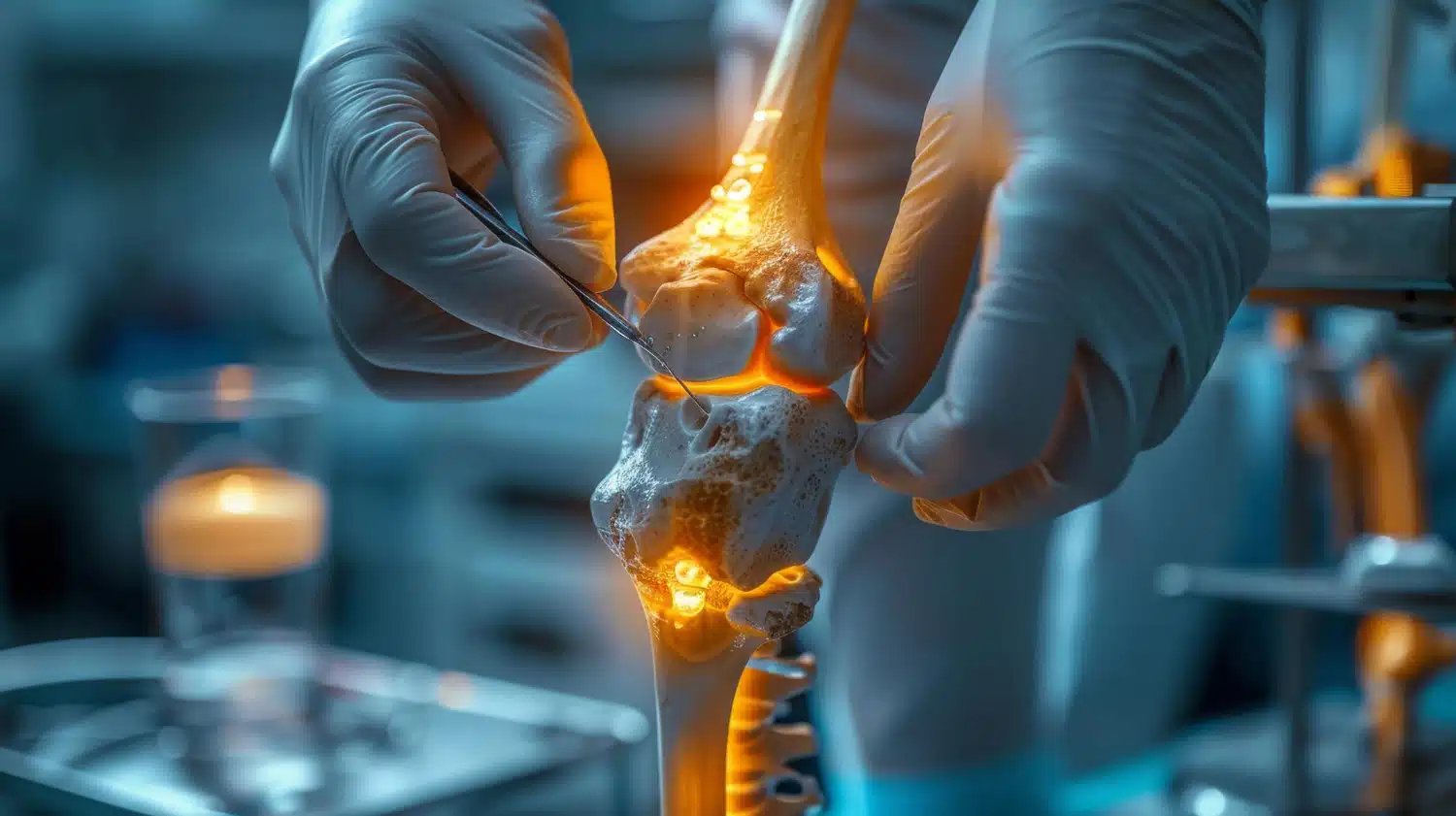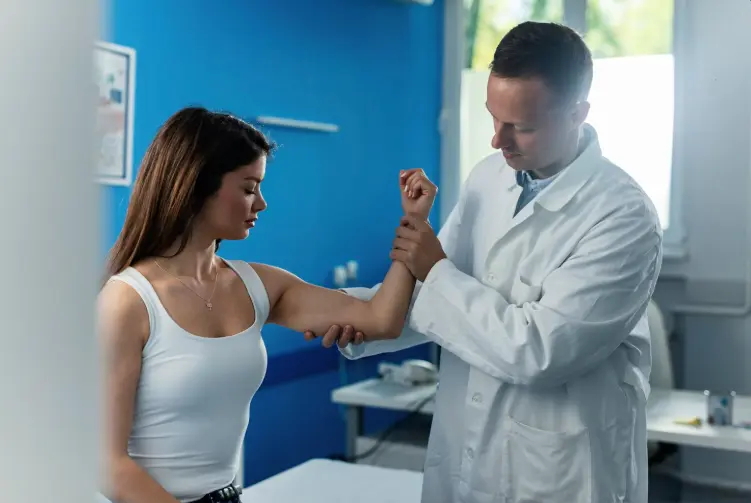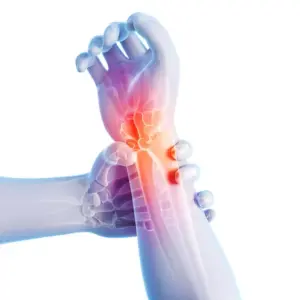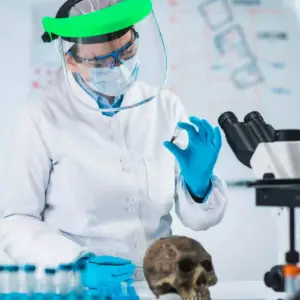Advanced Bone and Soft Tissue Cancer Care
Get advanced bone cancer diagnosis, personalized treatment plans, and expert orthopaedic oncology care at VS Hospitals.

Orthopaedic Oncology
Orthopaedic oncology focuses on the diagnosis, treatment, and management of bone and soft tissue cancers, as well as tumors that affect the musculoskeletal system. While cancers of the bones and joints are rare compared to other types of cancer, they can have significant impacts on a patient’s quality of life and mobility. Orthopaedic oncologists specialize in treating primary bone cancers (such as osteosarcoma) and soft tissue cancers (such as sarcomas) that can affect the muscles, tendons, and ligaments.
At VS Hospitals, we provide advanced care for orthopaedic oncology patients, offering cutting-edge treatment options, surgery, rehabilitation, and multidisciplinary care to ensure the best outcomes.

Early Detection Saves Lives
Early detection and treatment are crucial for improving the chances of survival. If you notice any concerning symptoms, consult a healthcare provider immediately.
Signs and Symptoms
Persistent Pain
Bone or joint pain that doesn’t go away or worsens over time, particularly when not associated with injury or trauma, is a common symptom.
Swelling or Mass
A noticeable lump or swelling around the bone or joint area that may be tender to touch.
Limited Range of Motion
Difficulty moving the affected limb or joint due to pain, stiffness, or the presence of a tumor.
Fractures
Unexplained bone fractures, especially in a healthy bone, may indicate a bone tumor.
Fatigue
Generalized tiredness or fatigue that doesn’t improve with rest, often linked with the body’s immune response to cancer.
Unexplained Weight Loss
Significant, unexplained weight loss may be a sign of more advanced stages of cancer.
Heat or Redness
Inflammation, warmth, or redness around the tumor area can indicate an infection or the presence of cancer.
Blood in Urine
Hematuria - pink, red, or dark urine, the most common symptom
Frequent Urination
Feeling the need to urinate frequently, even when bladder is not full
Painful Urination
Experiencing pain or burning sensation while urinating
Back or Pelvic Pain
Pain that occurs as the cancer grows and spreads
Unexplained Weight Loss
Significant weight loss not related to diet or exercise
Fatigue
Feeling unusually tired or weak without a clear cause
While these symptoms can also be associated with less serious conditions, persistent pain, swelling, or changes in the body that don’t improve with standard treatment should be evaluated by a healthcare provider.
Meet Our Expert Orthopaedic Oncology Oncologists
Risk Factors
Smoking
Smoking is one of the leading causes of bladder cancer. Chemicals in tobacco smoke can damage the lining of the bladder, increasing the risk.

Gender
Men are at a higher risk of developing bladder cancer than women.

Chronic Bladder Infections or Inflammation
Conditions such as bladder infections and long-term bladder inflammation can increase the risk.

Exposure to Chemicals
Prolonged exposure to certain chemicals, especially those used in the dye industry, rubber production, and chemical manufacturing, increases the risk.

Age
Certain types of bone cancer, such as osteosarcoma, are more common in children and young adults. Conversely, other types of bone cancer may occur more frequently in older individuals.

Genetic Conditions
Inherited genetic conditions like Li-Fraumeni syndrome, retinoblastoma, and familial multiple exostoses can increase the risk of developing bone cancers.

Previous Cancer Treatment
Past radiation therapy, especially at high doses, can increase the risk of developing bone or soft tissue cancer later in life.

Radiation Exposure
Occupational or environmental exposure to radiation may increase the risk of cancers, including those in the musculoskeletal system.

Chronic Inflammation
Conditions such as Paget’s disease, which causes abnormal bone remodeling, increase the risk of bone cancer, particularly osteosarcoma.

Family History
A family history of bone cancer or soft tissue sarcomas can increase the likelihood of developing these conditions, suggesting a hereditary component.

Chemical Exposure
Long-term exposure to certain chemicals, such as herbicides and pesticides, can increase the risk of soft tissue sarcomas.

Orthopaedic Oncology
Diet and Nutrition
Prevention
Diagnosis
Key Services
Key Facilities
Nutrition plays a significant role in improving the body’s resilience during cancer treatment and recovery. Proper dietary planning supports immunity, aids healing, and enhances tolerance to chemotherapy or radiotherapy.
- High-protein intake: Helps rebuild tissues after surgery or treatment; include lean meats, eggs, legumes, and dairy products.
- Antioxidant-rich foods: Fruits like berries, oranges, and papayas combat oxidative stress caused by cancer therapies.
- Calcium and vitamin D: Strengthen bones and reduce treatment-related bone loss; sources include milk, cheese, and fortified cereals.
- Hydration: Staying well-hydrated flushes toxins and supports kidney function during drug therapies.
- Whole grains: Brown rice, oats, and quinoa improve digestion and energy levels.
- Avoid processed foods: Sugary or refined foods may cause inflammation and reduce treatment effectiveness.
- Limit red and smoked meats: These may contain carcinogens that could worsen inflammation.
At VS Hospitals, clinical dietitians collaborate with oncologists to create personalized meal plans suited to each patient’s condition and recovery phase.
While orthopaedic cancers cannot always be completely prevented, adopting protective measures can reduce risk and support early detection.
- Genetic screening: Individuals with a family history of bone cancers can undergo genetic counseling and early screening at VS Hospitals.
- Avoid unnecessary radiation exposure: Ensure protective measures during diagnostic imaging and limit exposure in high-risk environments.
- Maintain bone health: Regular weight-bearing exercises and a calcium-rich diet strengthen bones and reduce susceptibility.
- Promptly treat injuries: Long-term untreated fractures or infections may increase cancer risk.
- Avoid tobacco and alcohol: Both weaken immune defense and increase cellular mutation risks.
- Regular medical check-ups: Annual bone scans and health evaluations help detect abnormalities before they progress.
VS Hospitals promotes community awareness programs emphasizing early diagnosis, lifestyle modification, and preventive health monitoring for bone health.
The diagnosis of orthopaedic cancer typically involves a combination of clinical exams, imaging tests, and biopsy. Accurate diagnosis is critical for determining the stage of cancer and selecting the most effective treatment options. The diagnostic process includes:
- Comprehensive Clinical Evaluation: Detailed assessment of pain, swelling, and functional limitations in bones or joints.
- Imaging Studies: X-rays, CT scans, and MRI to identify bone lesions and determine tumor extent.
- Bone Scintigraphy (Bone Scan): Detects abnormal bone activity and helps differentiate between benign and malignant growths.
- Biopsy and Histopathological Examination: Confirms the nature of the tumor through tissue sampling and microscopic analysis.
- PET-CT Scan: Evaluates cancer spread and assists in staging for treatment planning.
- Laboratory Investigations: Blood tests to assess tumor markers, inflammation, and overall health status.
- Multidisciplinary Case Review: Collaborative discussion among oncologists, radiologists, and orthopedic surgeons for accurate diagnosis and treatment planning.
Timely and accurate diagnosis is critical for planning the most effective treatment approach and improving the chances of successful outcomes.
At VS Hospitals, we offer a comprehensive range of services for the diagnosis, treatment, and management of orthopaedic cancer. Our specialized services include:
- Multidisciplinary Team: Our team of specialists, including orthopaedic oncologists, medical oncologists, radiologists, and surgeons, work together to provide comprehensive care for each patient.
- Surgical Treatment: VS Hospitals offers advanced surgical procedures, including limb-sparing surgeries for soft tissue sarcomas and amputation when necessary, depending on the extent of the cancer.
- Radiation Therapy: Radiation therapy is offered to shrink tumors before surgery or as a stand-alone treatment for tumors that cannot be surgically removed. We use the latest equipment to provide targeted radiation.
- Chemotherapy: Chemotherapy is often used for soft tissue sarcomas or advanced bone cancers to kill cancer cells, reduce tumor size, or prevent cancer recurrence.
- Targeted Therapy: In some cases, we offer targeted therapy, which focuses on specific cancer cells or proteins involved in tumor growth, providing a more effective and less toxic treatment.
- Palliative Care: For patients with advanced orthopaedic cancer, palliative care is available to manage pain, improve mobility, and enhance the quality of life.
- Rehabilitation Services: Post-surgical rehabilitation, including physical therapy, is essential to help patients regain strength, mobility, and function following cancer treatment.
- Psychosocial Support: Our hospital provides emotional and psychological support, including counseling and support groups, to help patients and their families cope with the emotional aspects of cancer treatment.
VS Hospitals is equipped with state-of-the-art facilities to provide the best care for orthopaedic oncology patients. These include:
- Advanced Diagnostic Imaging: The hospital uses cutting-edge imaging technologies, including MRI, CT scans, X-rays, and PET scans, for the accurate diagnosis and staging of orthopaedic cancers.
- Surgical Suites: VS Hospitals has modern surgical suites equipped with the latest technology to perform both complex and minimally invasive orthopaedic oncology surgeries with precision and care.
- Radiation Therapy Units: Our radiation therapy units are equipped with advanced technologies to provide targeted radiation therapy for both bone and soft tissue cancers, ensuring the best outcomes.
- Oncology Department: The oncology department at VS Hospitals specializes in the treatment of bone and soft tissue cancers, offering a multidisciplinary approach and personalized treatment plans for each patient.
- Physical Therapy and Rehabilitation Centers: The hospital has dedicated physical therapy and rehabilitation centers to help patients regain strength and mobility after treatment, enabling them to return to their normal activities.
- Comprehensive Cancer Care: From diagnosis through treatment and rehabilitation, VS Hospitals offers integrated cancer care, ensuring that patients receive holistic care throughout their journey.
Top Medical Facilities at Our Multispeciality Hospital – Here’s What Makes Us Different!
Ready to Begin Your Orthopaedic Oncology Care Journey?
Learn More About Orthopaedic Oncology
Frequently Asked Questions
Common symptoms of orthopaedic cancer include persistent pain, swelling or lumps in the bones or soft tissues, limited range of motion, unexplained fractures, fatigue, and weight loss. If you notice any of these symptoms, it is essential to consult a healthcare provider for proper evaluation and diagnosis.
At VS Hospitals, orthopaedic cancer is treated through a combination of surgery, radiation therapy, chemotherapy, and targeted therapies. A personalized treatment plan is developed based on the type, location, and stage of cancer, ensuring the best possible outcome for each patient.
While it is not always possible to prevent orthopaedic cancer, maintaining a healthy lifestyle, managing risk factors such as smoking, and regular screenings for high-risk individuals can help reduce the chances of developing bone or soft tissue cancers.
